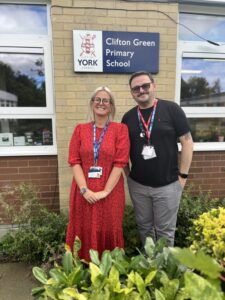
Based in schools across North Yorkshire, they provide an important support service to students experiencing emotional wellbeing difficulties.
The team, which is made up of NHS professionals including senior clinicians, occupational therapists, and education mental health practitioners (EMHPs), now supports 64 schools within Hambleton and Richmond, Selby, Scarborough and Ryedale, and Harrogate and York.
Laura Campleman, one of our education mental health practitioners based in York, explains:
“We support schools across North Yorkshire with early intervention, knowledge, and training to develop emotional resilience and promote positive health and wellbeing.
“This is especially important at the beginning of a new school year, which can be a worrying time for families. We see a lot of issues around transitioning to secondary school and friendship conflicts at this time of year.”
The best piece of advice Laura would give to children, young people and their families would be: “Look after your mental wellbeing just as much as you would your physical wellbeing; practise the NHS 5 ways to wellbeing; and be mindful about how you speak to yourself – sometimes it can be quite a lot of negative, self-critical talk. Try to speak to yourself as you would a good friend.
Also give yourself some kindness and compassion because it's tricky for everyone to go back to school and it’s important to acknowledge that.
Other useful tips to prepare for school from Wellbeing in Mind experts include:
- Get into a good routine and prepare everything the night before – ready for the next day.
- Practice good sleep hygiene and avoid screen time an hour before bed.
- If you need to get used to a new routine, try practising beforehand.
- Practise breathing and relaxation techniques to calm your mind.
- Try to focus on one day at a time to avoid feeling overwhelmed.
- Find a support network of people in the same situation as you who you can share your experiences with.
- Have a reward at the end of the week to acknowledge it’s been tricky, but that you’ve got through it.
Expansion to support more schools

Wellbeing in Mind Teams began operating in Scarborough and Selby in September 2020 and have expanded significantly across North Yorkshire during the last three years.
In York alone, the team has increased its support from eight schools in 2021 to 20 in 2024. The team in Scarborough has also further expanded recently also taking on around 20 schools.
“There are three approaches to the work we do in schools,” Laura said. “The first is our whole school approach. This might include delivering training about mental health issues to staff, offering welcome assemblies to remind students how to look after their wellbeing, and group activities bespoke to the school’s needs, for example, self-esteem and friendships.
The second approach is our early interventions that support children and young people with common emotional wellbeing difficulties such as low mood, low self-esteem, and anxiety. This could include up to eight one-to-one sessions that are goal focussed.
“We also work with other services for those with more complex issues so they can find the help they need. This could be a referral to Child and Adolescent Mental Health Services (CAMHS) or signposting to charities such as The Island in York or neurodiversity groups.
“And thirdly, we offer consultations. This is where we meet with a member of school staff who has a concern about a young person. Our aim is to support the school to support the young person. If we feel more direct support is needed, we consider whether one-to-one or group support from us would be most beneficial. If we’re not the right support, we would then find the most appropriate service for them.”
The specialist team are embedded in school life and usually spend one to two days per week in the schools they support.
“We are very much a part of the staff team,” said Laura. “We’re involved in staff meetings, whether that’s offering advice or helping to plan what the next half term is going to look like. We also go out on the school playground at break and lunchtimes to show our faces, so the children and young people get to know who we are.”
Making a difference
Laura, who is a graduate in early childhood development and learning and has previously worked in a nursery supporting children with additional needs, said her role is ‘very rewarding’ and makes a direct impact:
It's really lovely to see you've made a difference. As we’ve intervened and it's still at a low level, early intervention stage, there’s a hope that it won't escalate: The child or young person or family will have developed a set of skills to support them going forward and they hopefully won’t need to access more complex support in the future.
“We also get really nice feedback from children and young people, and their families saying they feel supported. Staff are also grateful to sound things out with us and check they’re on the right lines, or for us to intervene if we feel it’s necessary,” Laura added.